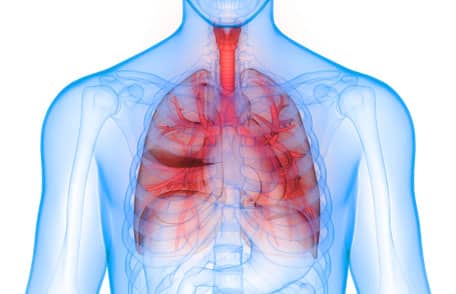
What are the risk factors of COPD? We’ve all heard of it. So what exactly is it and are you at risk? How do you get a diagnosis? We’re here to walk you through the most important information and what your next steps might be.
First, what is COPD?
Chronic obstructive pulmonary disease (COPD) is a chronic inflammatory lung disease that causes obstructed airflow from the lungs. Symptoms include breathing difficulty, cough, mucus production, and wheezing. It’s caused by long-term exposure to irritating gases or particulate matter, most often from cigarette smoke. People with COPD are at increased risk of developing heart disease, lung cancer, and a variety of other conditions.
Symptoms often don’t appear until significant lung damage has occurred, and they usually worsen over time, particularly if smoking exposure continues. For chronic bronchitis, the main symptom is a daily cough and mucus (sputum) production at least three months a year for two consecutive years.
What are the risk factors?
According to lung.org, over time, exposure to irritants that damage your lungs and airways can cause COPD. The main cause is smoking, but nonsmokers can get COPD too.
Smoking
About 85 to 90 percent of all COPD cases are caused by cigarette smoking. When a cigarette burns, it creates more than 7,000 chemicals, many of which are harmful. The toxins in cigarette smoke weaken your lungs’ defense against infections, narrow air passages, cause swelling in air tubes, and destroy air sacs—all contributing factors.
Only about 20 to 30 percent of chronic smokers may develop clinically apparent COPD, although many smokers with long smoking histories may develop reduced lung function. Some smokers develop less common lung conditions. They may be misdiagnosed as having COPD until a more thorough evaluation is performed.
Your Environment
What you breathe every day at work, home, and outside can play a role in developing COPD. Long-term exposure to air pollution, secondhand smoke, and dust, fumes, and chemicals (which are often work-related) can cause COPD.
Alpha-1 Deficiency
A small number of people have a rare form of COPD called alpha-1 deficiency-related emphysema. It’s caused by a genetic (inherited) condition that affects the body’s ability to produce a protein (Alpha-1) that protects the lungs.
Helping and coping with the diagnosis
Twenty-four million Americans suffer from COPD, so knowing you aren’t alone is important.
The COPD Foundation suggests these steps –
- Learn more. Understanding what’s happening in your lungs and learning proper breathing techniques can help you control your breathing instead of letting it control you. Ask your health care professional about referring you to a pulmonary rehabilitation program.
- Talk with others. In pulmonary rehabilitation or a support group, you will learn from experts, as well as share ideas and find encouragement from others who have the same concerns.
- Stay active! You may not be able to do some of the things you used to do, but it shouldn’t stop you from doing everything! By staying active and exercising, you’ll improve your overall fitness, strength, flexibility, and state of mind.






